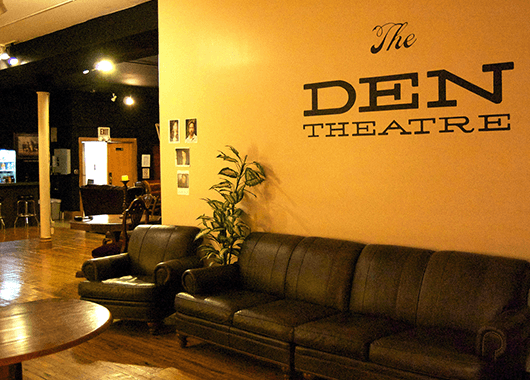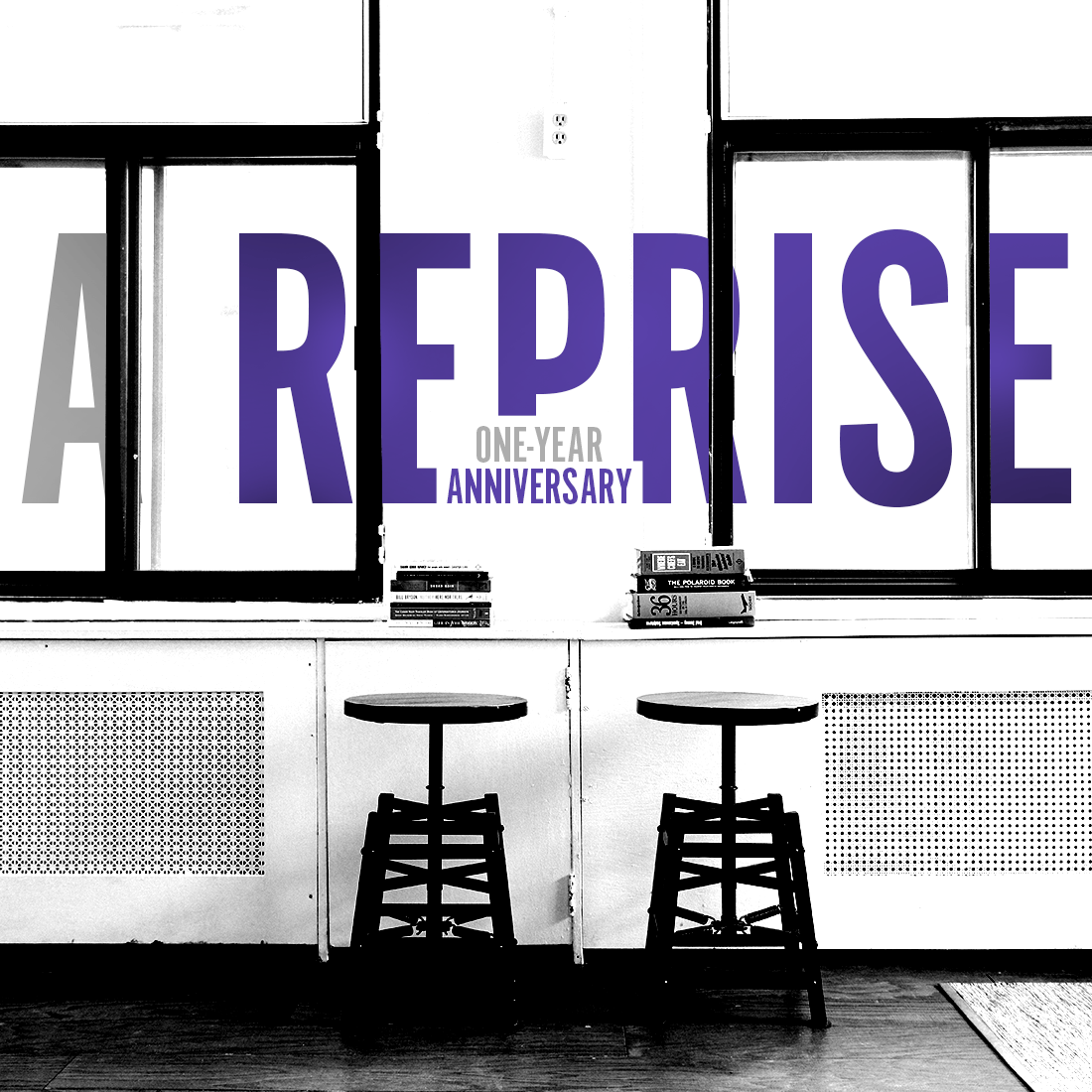NATALIE GALLAGHER

Interview photo by Ben Hertel
In this issue, we sat down with Cole von Glahn, Director of Production for First Floor Theater in Chicago, to talk about what’s involved in production management and how he sees Chicago storefront theaters moving towards including artists from underrepresented groups.
Hi Cole, thanks for making the time to do this interview!
Can you tell the readers a little bit about your job as a [production] manager and how you ended up working in that capacity?
Cole von Glahn
I got a degree in directing, but I had a fair amount of experience in build, production, and carpentry and all those things. When I [graduated from Tufts University in 2014] I was first looking to be more of an artistic administrator. Once I arrived in Chicago, I discovered that it was a more open field for production management.
Do you have a favorite moment as a production manager so far?
Cole von Glahn
Broadly speaking, anytime I get to walk away from an opening night and be like, “Oh, everything happened,” I get to feel good. When you take an architectural boat tour of Chicago, and you see all those super pretty buildings, you’re not looking at the steel beams behind them, but they’d all fall down without the steel beams. And sometimes I get to feel like that, and that’s pretty great. I get to feel like a steel beam inside Willis Tower.

Specifically, I think the thing that I love the most about it is once you get into [technical rehearsal], it sort of becomes an all bets [are] off situation, where you just have to creatively solve a thing as quickly as possible. Being able to problem solve under pressure creatively, that’s a lot of fun.
I think another thing, from a production management standpoint, is the idea of mentorship. We are asking young artists [for] a lot when we ask them to just step into the world and figure it out, and I think a lot of college programs [don’t prepare students.] I think it’s really important for theatre’s survival and growth that we mentor young artists sustainably and comfortably, and we help them incubate — and that’s one of the things that I really love about the work that I do. It gives me a chance to say yes to people, [to] say, “I’m going to figure out the way to make that happen for you.”
For the management component [of your work], what does that include?
Cole von Glahn
At First Floor Theater, I am the director of production and that’s [for] the whole season. It’s everything from setting the season budget with our managing director, to scouting and [contracting] all of our designers and stage managers and everybody else, to maintaining those budgets. Frequently, I’m the person doing the purchasing and the sourcing. It’s a pretty big grab bag of things that tend to fall to me, but [I] basically think of it as all the budgets, all the contracting, [and much of] the personnel. Then, once the show starts going, [it’s] making sure all the technical stuff is happening and filling the gaps where necessary. As a freelance production manager, it’s all of that, but just for one show.
How much does that job vary by [staff] composition, and how much does familiarity matter?
Cole von Glahn
Almost entirely. If I know people, if I’ve worked with them before, it’s always easier. Especially in a freelance world, different people have different preferences, and learning those preferences can be hard. Most designers and technicians working in storefront theatre are on three to five shows at any one time. To a certain extent, my job is to be loud, and to be like, “Remember our show? We’re over here!”

Source: © Goldstar
I would actually say the biggest thing that affects the way that production management works is whether or not the company knows the space they’re working in. There [are] three sets of stakeholders [involved in] putting together any given play in the storefront community: the company doing it, the artists that they’ve hired, and the theater that they’re doing it in. [First Floor does] all of our work out of The Den, and a big part of my job is negotiating with The Den and keeping them apprised of what we’re doing and how we’re doing it. When I go to other spaces that I don’t know as well — or that maybe the company doesn’t know as well — that’s much more difficult. Because you have to establish a rapport really quickly, and establish a trust that you’re not going to break their space.
What do you think makes sense as a theater company’s orientation towards money?
Cole von Glahn
I think that what every theatre artist needs to pretty actively fight against is this idea that poverty is purity. I did an apprentice program, the first year that I was out of college, where I was doing administrative and directorial work for one of the largest and best-funded theaters in the country. In many ways, it was a fantastic experience; it was everything I was promised; it was [an] opportunity to work at a level that I might not otherwise have at that age. But, ultimately I think those programs — through no fault of that theater specifically — are the worst thing for the American theatre, because they teach young artists not to value their work. They teach us that $75 a week is an appropriate paycheck for what we’re doing.

I think that that idea — that not having money makes you a better artist, or makes your passion more true — is really dangerous. I’ve seen incredible art at the best theaters in the country — Steppenwolf, Berkeley Repertory, A.R.T. in Boston, shows in New York at commercial houses; [all] incredible art. Meaningful, passionate, [and] engaging. I’ve seen unbelievable art at companies that have a $30,000-a-year operating budget, and they do three shows [with] that, and it’s fantastic art. So I think it’s hard to quantify the quality of art versus the amount of money spent on it.
Do you think [theatre] technicians get enough recognition?
Cole von Glahn
I think that’s really important — to recognize technicians as artists. They don’t get nearly enough credit. Anybody who creates theatre is an artist, no matter what their contribution to it is, because they have chosen to dedicate themselves to a field that is not going to pay them as much as their skills could get them elsewhere, and they’ve done that for an artistic purpose. It is a recognition of great art that makes theatre accountants artists [as well], because they’re saying, “I’m going to make sure that these bills get paid so that this art can exist, because I value it.” Good stage managers are the best artists out there.
To pivot – there’s this idea that storefront theatre [in Chicago] is consciously trying to change how it represents different people and different voices and trying to focus on previously marginalized voices.
Could you speak a little about that?
Cole von Glahn
I think that there are movements like this across the country. A lot of theatre gets made by a lot of white people for a lot of white people; that is pretty true. We are going to die as an art form if we don’t embrace the community that makes theatre and embrace the community that it’s made for. If we don’t capture the who, then all of the what’s, how’s and why’s kind of stop mattering as much. In Chicago, there are a ton of groups that have come out — representing actors, representing designers, representing administrators — to get more diverse voices on many spectrums. More female voices; more LGBTQ; non-[gender]-identifying; racial — all those lines. They’re trying to say, “How do we even the opportunity playing field? How do we make sure that we are appropriately representing the community that makes that theater, and the community for whom it is made, across all those positions?” Three really inspiring ones here in Chicago are Chitac, ALTA, and the Chicago Inclusion Project. If you are looking to support this work, those are fantastic organizations to familiarize yourself with.

The Alliance of Latinx Theater Artists of Chicago, or ALTA | Source: © ALTA
Are they for all sorts of theatrical positions, or is it specifically for actors?
No, it’s all over. One of the things that’s really important is that representation has to be from backstage to front, and frontstage to back. Because — I mean, this seems so obvious — but not every black theatre artist is an actor. [For example,] we need to create representative space for black designers, [and] we need to create representative space for Hispanic designers — it’s extremely important that everyone is given their shot.
Will this affect the audience experience in ways that they’re aware of?
The shortest answer is yes. Ultimately, it’s all for the audience. What we create doesn’t exist without an audience. I think the “most visible” [answer] is “are there actors on stage that are representing my identity?” I would place the same importance on design and direction.
It’s one of the reasons that I’ve moved more into management. In the world of storefront theatre, where people are trying so hard to tell these stories, I don’t want to be the white dude directing the play about the black woman[‘s] experience, because it’s not mine. It’s not to say that we shouldn’t be engaging in art that tells other people’s stories. But you’ve got to let people tell their story. You have to open that door for someone else.
I think what Chicago storefront theatre is trying to do right now, and what many theater communities across the country are trying to do, is acknowledge how systemic oppression has defined the way that art is made and who gets to make it. Because every time someone gets the job just because they’re already there; they may be fantastic artists, but competition is good. If you want a thing, you should win the thing because you’re good. The way that things have been stacked up to this point in our history, that’s not been the case. It’s on us to make that possible for everybody, and that’s when the best art is going to happen, and that’s when people are going to care about theatre.
We need, as theatre artists, to provide something that other arts [and] other art industries are not providing. So [for example] consuming [a Steppenwolf play called Pass Over] alongside a more diverse audience was more powerful than if I had been sitting there in the audiences that I usually see. And that was really exciting because, I think, that’s what’s being created [in storefront theaters]: the opportunity for art that is incisive. The opportunity for art that opens its doors to multiple voices and that speaks those voices to many different types of ears, and I think that’s what’s really important and sort of the drive behind the whole thing.
Audience response to Pass Over | Source: © Steppenwolf Theatre Company/YouTube
Well, that seems like a great ending point, but did you have anything to add?
Cole von Glahn
I want to be really clear insofar as I can that I am in no way a mouthpiece of this movement. I’m one dude who works at a theater [company] and thinks these things are really important. But the people who are really making it happen aren’t me. It’s really important to throw support behind the artists and managers and administrators who are driving this train right now, and I’m really happy to be a teammate of theirs, and a colleague of theirs, and I contribute in the ways I am able. I think it’s really important, whether you are working in theatre or consuming theatre, put your time and passion into the companies that are doing the type of work that reflects the world you want. I’m fortunate, really, to be in a community that recognizes the importance of that, and recognizes the importance of everyone being a part of that, so I can be a part of it.
Thank you so much for your time!
Cole von Glahn
He is a production manager, nerd writer, game designer, and director living in Chicago. Cole is the Director of Production at First Floor Theater, and has worked with many lovely companies around the city. He loves to tell stories of strange and fantastical proportions that capture our own weird world. If you ever want to join him in telling a cool story or building a crazy game, he is pretty easy to find!





